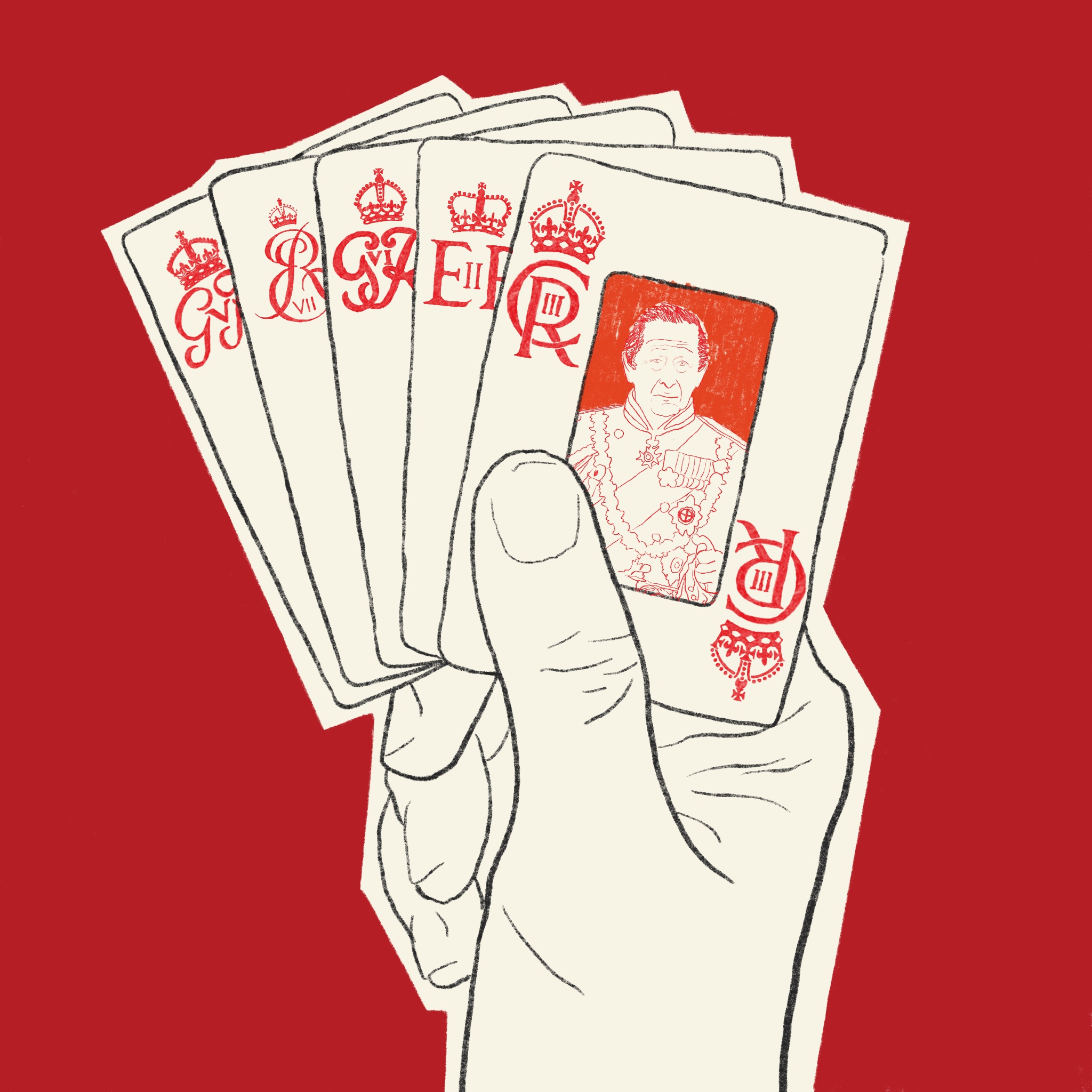Words: Dylan Brewerton-Harper (he/him)
Artwork: Lewis Aitken (he/him)
If the Queen’s death and the ascension of Charles to the throne passed you by, it’s likely you share my republican sensibilities. Maybe you simply didn’t care. A fair position considering the relentless inundation of top-down directives to ‘mourn’ a woman who none of us actually knew or could ever know. We are told that she was ‘one of us’, she ‘lived amongst us’ or even that she ‘saw things’ throughout her long reign that none of us could have seen – as if she were down at the barricades, rather than sat behind the guarded walls of her various castles and palaces.
However, the ways in which we interact with the history and iconography of the Queen and the monarchy through cultural mediums is of particular interest. I find myself in that unenviable but no doubt common paradox of being a staunch republican in love with The Crown. Its navigation of nearly a century of our history is done with much tact, boasting both excellent writing and performances from some of the UK’s best and brightest, whilst the show’s potentially laboured and labyrinthine relationship with the truth hangs over its entertaining narratives like the sword of Damocles.
This latter point has been pressed by those fervent royalists amongst us – The Guardian’s Simon Jenkins using a litany of hyperbolic adjectives such as “fabrication”, “offence”, “cowardly” and “false history…hijacked as propaganda”. However, the show continues to be one of the most globally loved and successful dramas (and also one of the most expensively produced at around $260 million). Despite Jenkins taking the viewer for unthinking, uncritical receivers of what is quite clearly a drama as a holier-than-thou, ‘inside access’ documentary, the show must and will go on.
Popular culture has no obligation to show deference to the royal family. The show’s success speaks to a fundamental aspect of the monarchy, and that is its secrecy. If they or their supporters take umbrage from the stories we tell each other, it is on them to pull back the veil and set us straight. They won’t, however, as it’s in their political and financial interest to maintain and fortify their secretive nature. Especially in light of the devastating revelations about Prince Andrew and the royal family’s treatment of Meghan Markle. If the curtain is drawn back, the house of cards might tumble down altogether. [1]
Throughout history, popular culture has played an important role in de-mystifying the deliberate void of information at the heart of our public institutions, whether it’s the monarchy, government or the armed forces. Supposedly serving a normative public interest, they have more often than not done precisely the opposite; the monarchy maintains an opacity that enables them to engage in a multiplicity of dubious activities and practices. Some critiques of non-realism in The Crown are thus ill-founded, because what else can writers do but combine the snippets of verified history and testimony with what is perhaps a large degree of artistic license?
This has been taken to brilliant extremes, with Mike Bartlett’s 2014 play and subsequent 2017 television adaptation King Charles III speculating on what his reign might look like with particular guile and foresight. I watched the TV version only a few days after the Queen’s death and would highly recommend you do the same, as it weaves through the first days and weeks of Charles’s reign. Beginning with the late Tim Pigott-Smith as Charles delivering to camera a relieved but triumphant “at last…my life has been a lingering for the throne…but now I’ll rise to how things have to be. The Queen is dead, long live the King…that’s me”. Bartlett and Pigott-Smith’s fictitious King Charles takes on the supposedly unorthodox role of the interfering and obstructionist monarch, refusing to sign a bill into law that would restrict the freedom of the press in the wake of the phone hacking scandal – plunging the country into a constitutional crisis.
Now of course, Bartlett’s ‘future history’ is an escapade into the unknown. Some might call it blasphemy, sedition, even treason. However, only recently have we seen the news that our new King “has been allowed to vet or potentially lobby for changes to emergency legislation to freeze rents in Scotland because the measures could affect tenants on his private Highland estate at Balmoral”. This open interference by an unelected monarch in the decisions of elected legislatures is an immediate manifestation of the insidious activities of the Crown. If we are to exist as an open democracy, then it is not only on the heads of investigative journalists but also of our writers, directors, and artists to produce culturally significant work that challenges those in the corridors of power. We cannot allow our new King’s accident of birth to herald in a new era of divine right.

